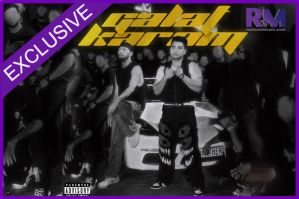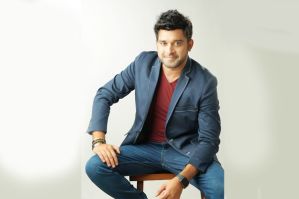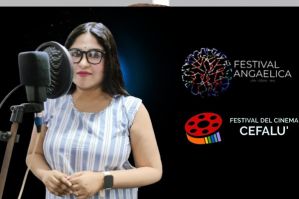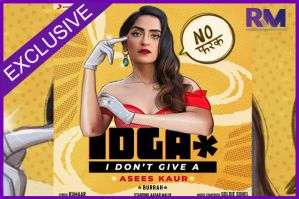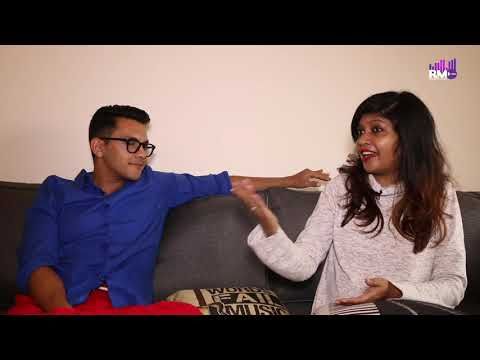Vidyashree: Music Therapy can be effective even through Radio
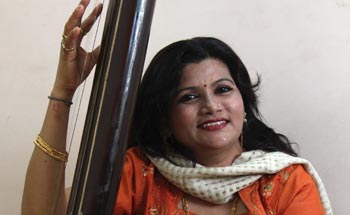
Today, most people confuse Music Therapy with some kind of entertainment, or a relaxing experience They are not aware that it can help one rid oneself of illnesses and diseases. Swagata Panjari met Vidyashree, a trained classical singer with a Masters in the subject and also a qualified Music Therapist from a Mumbai institute, who believes that although strongly based on one-to-one interaction, Music Therapy can be effectively offered via Radio to cure listeners' general health and other problems. Vidyashree says that even medical doctors, now appreciative of the strong healing powers of music and the positive and elevating effect it can have on patients, are recommending Music Therapy to patients, and offers suggestion on how Radio programmers can offer music therapy to their listeners. Excerpts from the conversation.
You are amongst possibly the first batch of trained singers who is also a qualified Music Therapist from Mumbai. Before we get into Music Therapy in particular, tell us about your musical background.
I have been in music since I was four years old, and without any training, used to sing by the ear. When I was in class 5, the school music teacher told my parents to encourage me as I sang really well. Fortunately, my parents did, and I began to receive classical singing lessons. By the time I was in the class 10, I had learnt most of the important raags of Hindustani classical music. I got so good at it that later, because my guru had asthma problems, he would ask me to demonstrate to the students. That was a great period of learning. Then I did an MA in Music (Classical vocals) from SNDT College Churchgate.
How did you learn about Music therapy?
It happened while I was doing my MA. A lecturer's brother, a Mr Shastri, used to give Music Therapy. I was aware that music therapy was being used in western countries; I knew various experiments had been carried out on animals and plants with extremely encouraging results, but those had been achieved with Western music. Using Hindustani classical raags was something new, and ours was probably the first batch to explore, learn and research about music therapy.
What educational qualification should one have for becoming a Music Therapist?
Basically, I believe it is essential that you have an MA in Classical music – whether vocal or instrumental, and preferably a melody instrument rather than a percussion instrument. There isn't any specific qualification needed, at least in India, to become a Music Therapist But one must be a trained classical singer or musician and know about all the raags -- their effect on the human psyche, their time of day or night for singing or playing, the effect they have, the difference amongst raags according to the time of day they are sung, etcetera. A degree in Music is essential if one is to provide effective music therapy.
While a Master's degree in Music is essential, what can help a great deal is a new six-month certificate program specifically for Music Therapy, which can help polish a trained singer or musician to focus intelligently and effectively on vital areas for Music Therapy. I have graduated from the first batch of such a program in Mumbai -- the MET Educational Program for Music Therapy from Mumbai Education Trust, Bandra.
There wasn't any course before this in India to teach Music therapy; ours was the first batch, and now, we are training the second batch.
See, until you are a trained classical musician or singer with a degree, I don't believe you can really go into the depths of the nuances of all the raags and their effect on people. You must have theoretical knowledge of the raags too. Music Therapy works on the conscious and sub-conscious mind, and one has to be careful about the kind of music therapy one gives to a subject. It has to be a perfect fit for the symptoms or needs of the subject.
What inspired you to obtain a certificate in Music Therapy?
I'm a trained classical singer, and what inspired me to train to be a Music Therapist was the thought that if Westerners can use music to treat patients, why not we in India, which has such a rich and timeless treasure trove of classical music? The Purans also eulogize the tremendous power of our classical raags, and how they were sung to get rainfall or cure diseases. But suddenly, all that has vanished. We are now following the Westerners, forgetting that what they are doing today is something our ancestors used to do centuries ago! So it is like coming back full circle. I guess my entire batch of students must have thought, like I did: When our music has such power, why not start with Music Therapy right here? At present we are researching what kind of raag can cure which type of disease, and its effectiveness for patients. Our group of qualified musicians even joins hands to give Music Therapy for patients.
How aware are we about Music Therapy in India?
People don't know much about it. Most people confuse it with some kind of entertainment. All that they vaguely believe is, Music Therapy probably relaxes you. But that is all they seem to know. They are not aware that it can help one rid oneself of illnesses, cure oneself of diseases. Very gradually, people are becoming aware of this important fact. In fact, even medical doctors now appreciate that strong healing powers of music, and the positive and elevating effect it can have on patients. Doctors are recommending Music Therapy to patients.
What kind of illnesses and diseases can Music Therapy cure? How can it help a patient?
In today's hectic and increasingly stress-filled lifestyle, I believe it is essential for Indians to have Music Therapy. Today, universally, there is a huge amount of stress and tension, which are leading to new diseases and stress-related disorders which affect the mind, body and heart. Music Threapy can effectively help in cases of insomnia, stress, depression, anger management and also aid meditation and concentration. We have noticed that the commonest result of stress is insomnia-related disorders, which are very dangerous because they do not allow the mind and body to sleep and get rest that is absolutely vital for good health, wellbeing, and productivity.
What is the best time of day to receive Music Therapy?
For basic problems, one can receive Music Therapy at any time. But for some specific problems the therapy could be time-sensitive. For instance, a person suffering blood pressure would need the therapy at the time of day when his or her BP problem is severe, and it could vary across people between morning and night, and at both times, two different raags would have to be used – one for the morning and another in the evening or afternoon.
How do you give Music Therapy to a subject?
We call the subject to our clinic the first few times, to study how a particular raag affects a person. Once we have identified the correct set of musical elements for the subject's therapy, we give a 15-day session in our clinic or make a CD of the music that they can listen to at home. For best results, a 4-week period is better.
With Radio having millions of listeners across India, don't you think Music Therapy could be a good genre of programming?
Yes, we can certainly have Music Therapy on Radio, but it is somewhat difficult to make it completely relevant to masses of people at the same time, because the problems or ailments people have would certainly differ from person to person, and typically, a Music Therapist must check an individual's pulse rate and complete medical background before determining the course of Music Therapy. That is why Music Therapy has largely been given on a one-to-one basis, particularly for specific problems. But having said that, I do believe Radio can successfully provide effective Music Therapy for general complaints like insomnia, blood pressure, stress and general and age-related aches and pains. In fact, the exam season, when students are going through 200% of stress, as was reported in the newspapers, is a good time to help students relax through music. A Music Therapy break through Radio would be the best reliever for students, and would make the Radio station their best friend in their time of need.
How would you go about offering Music Therapy on Radio?
Obviously, we would single out the commoner ailments. We would need to offer minimum 2 and maximum 4 weeks of Music Therapy on Radio – that is the average time it takes to have an effect even on a one-to-one basis. So, if stress is the first complaint we target, we would decide upon the music, sequence it for playout, and also arrange the positive and uplifting messages that can be shared with the listeners as advice to follow in their day to day lives. A Music Therapist is effective only through a combination of things; yes, music is the biggest element, but it alone cannot cure serious ailments. The listener or subject has to want to receive help, and must will himself or herself to cooperate happily and with positivity. Optimism is important. Stress is compounded by the state of the mind, after all. So the listener has to cooperate, relax and concentrate upon the music and messages being given out on the program.
What kind of success do you foresee for Music Therapy on Radio?
The success will be measured by how effective it is, ultimately. But there has been no past precedent of Music Therapy in India, at least to my knowledge. However, for general purposes or ailments, I am confident that if delivered properly and followed properly by the listeners, Music Therapy can effectively help listeners through Radio.
How would you advise a Radio Programmer to create Music Therapy content?
First, for general and the most common ailments, it should be a bit early in the morning, or in the afternoon, or late evening or night. The early morning and late evening timings would make sure that popular songs and other programs will not suffer in the prime time of Radio. So plan for Music Therapy programming in the morning or evening.
Music therapy would need at least half an hour of time, with most of it for music, so maybe early morning and late night would be a good time.
Do it like a very genteel talk show where, only in the first five minutes, discuss the causes of the problem – for example stress – and how to tackle it in daily life with a positive attitude. Give self-help and encouraging tips for the listeners who are facing stress at home or at work or in personal relationships or due to family pressures. Encourage two or three different types of callers to discuss their problems in detail, and keep them anonymous for their identity. If you can get a good Music Therapist who can also speak nicely and brightly and in a way that inspires confidence in the listeners, it would be great. But if you want to have a Radio RJ to coordinate the Music Therapist's conversation with the listeners, that too is fine. But the RJ should be sensitive to the situation and speak softly and gently.
Five minutes maximum of talking, in a serious and concerned manner, on the ailment of the day, followed by the Music Therapy in which the Music Therapist hand-holds the listeners in the privacy of their homes, speaking in a strictly one to one manner, individually, and not like RJs are doing today, saying mere sun-ne waalo... etcetera. It has to be a one to one conversation.
The program can tackle stress and stress-related disorders in the mornings, and sleep-related disorders like insomnia etcetera in the night.
What disadvantages would Radio face in its one-to-many – and impersonal – Music Therapy sessions as against the personal presence of a music therapist in a one-to-one session?
The main disadvantage is already mentioned in your question. You see, the listeners would take time to create at home the atmosphere for Music Therapy, and the mood for it. When we go to a doctor, it is with a certain mindset and seriousness of purpose; we seriously make a positive effort to accept and assimilate the treatment and help ourselves get cured. The intelligent listener would have to create the same atmosphere at home with on-air help from the radio. It could be a bit difficult to start with. Also, we cannot check the subject personally or visually but have to rely upon verbal communication only. But let me say that with the right frame of mind and effort from the listeners, Music Therapy on Radio could be effective.
Can one continue to receive Music Therapy after completely recovering?
Of course. Music is like Ayurveda for the Mind and Soul. There are no harmful effects. So long as it is the kind of music you were, well, prescribed.
So there would be no harmful side effects for passive listeners of a Music Therapy program who don't suffer from the symptoms of the problem the show is tackling?
No. On Radio, we could only attempt to tackle general problems like stress, insomnia and others which are anyways mass problems, but for any serious disease, the Music Therapist would have to meet the subject. And remember, Music Therapy is a very strong complement to the medical treatment, and does not replace any medical treatment. But as I said earlier, it is okay for other listeners to listen.







